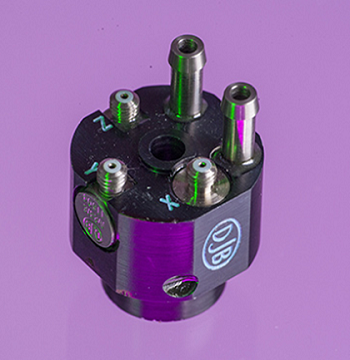The Challenges of High Temperature Vibration Measurement reaching up to 900°C

Over the 40 years it has been manufacturing accelerometers and vibration sensors, DJB Instruments UK Ltd has seen a gradual increase in the requirements for vibration measurement in higher and higher temperature environments, whether it is in automotive, aerospace or industrial applications.
Typical applications often require +400°C and in extreme cases such as exhaust and turbo charger testing it can go as high as 900°C+, these are not conditions that should be taken lightly and represent truly challenging environments for any sensor let alone a device trying to produce dynamic responses over a temperature range that causes most materials to change dimensionally and dynamically.
The core of a piezoelectric accelerometer has a piezoelectric material (crystal or ceramic) which outputs a charge when stressed by the mass, it is this principle that provides the vibration output for analysis purposes. However, the temperature environment is directly related to the capability of the PE material to provide a linear output and this is what limits the range of current accelerometers. Other challenges include the desire for users to have an IEPE accelerometer (Integral Electronics Piezoelectric) which has all the required charge to voltage conversion and amplification built in; of course adding electronics into a high temperature environment doesn’t make the job any easier.
There are a number of steps taken to ensure high temperature performance:
· Mechanical coupling of the mass and PE element – this means there is no reliance on adhesives
· Use of metals such as Inconel for the accelerometer bodies
· Integral stainless steel or Inconel sheathed cables
· Glass to metal sealed connectors
DJB’s solutions using current materials technology include charge output accelerometers that can offer 450°C and above, these use high temperature piezoelectric ceramics and are widely used in industrial and aerospace applications for machine/system/engine health monitoring.
IEPE technology has advanced to the point where most types of monoaxial and triaxial accelerometers can now be used up to 185°, a significant step up from the standard 125°C, even this step required a new development of electronics to provide a stable bias voltage to maximise dynamic range at the peak temperatures.
In the more extreme applications such as turbo charger testing a unique water cooled solution enables the triaxial accelerometer to be mounted directly on the surface which can be up to 900°C, the simple constant water flow, provided by a low cost windscreen washer pump, keeps the sensing elements to below their operational limits, this also means that an IEPE version is also available. Introduced in the 1990’s this type of unique solution has now become the industry standard for turbo and exhaust testing and it’s development has continued to extend the operational range.
It is these sort of extreme applications that can really show what is being achieved, particularly when things go wrong, a recent test program on some turbo charges was running for several days and during the test the water pumping system failed, the pictures below show the amazing results of melted accelerometers. To be able to provide useful vibration measurement data in an environment that can melt sensors, it highlights the challenges that DJB has to overcome.
So what about the future?... The next generation of PE accelerometer is already under development, not only the potential for wireless communication but in addition a whole new family of piezoelectric materials to offer higher and higher operating conditions. Customer requirements already specify +600°C not only for vibration but also in dynamic explosive pressure environments, DJB now find themselves in the field of materials science, an essential step to maximise the relevance of the piezoelectric capability.
If you have a challenging application that would benefit from high temperature accelerometers or have a new requirement looming please get in touch, the more information we have about requirements the better we are placed to develop the right solutions.
DJB Instruments UK Ltd Sales +44 (0) 1638 712 288 or email sales@djbinstruments.com